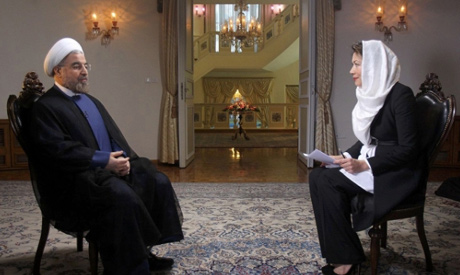
Iranian President Hassan Rouhani speaks during an interview with Ann Curry (R) from the U.S. television network NBC in Tehran, in this picture and provided by the Iranian Presidency September 18, 2013 (Photo: Reuters)
Iran's new President Hassan Rouhani described Israel as an "occupier" who has brought instability to the Middle East but said the Islamic republic did not seek war with any country.
In the second part of an exclusive interview with US broadcaster NBC aired Thursday, Rouhani also deflected a question on whether, like his predecessor Mahmoud Ahmadinejad, he believed the Holocaust was a myth.
But he said Tehran was not seeking war but rather peace in the region when specifically asked about archfoe Israel.
"We believe in the ballot box. We do not seek war with any country. We seek peace and friendship among the nations of the region," he said through a translator.
Still, he branded Israel as an "occupier and usurper government that does injustice to the people of the region and has brought instability to the region with its warmongering policies."
It "shouldn't allow itself to give speeches about a democratically and freely elected government," he said.
When asked about the Holocaust, he said: "I'm not a historian. I'm a politician."
"What is important for us is that the countries of the people and the people grow closer to each other and that they are able to prevent aggression and injustice," he said.
The interview aired just days before Rouhani travels to New York for the UN General Assembly.
In his comments that aired Wednesday, Rouhani said Iran, whom the West suspects of pursuing a nuclear program for nonpeaceful purposes, would never seek atomic arms.
He reiterated that stance in the newly-released remarks.
"We have clearly said we are not in pursuit of nuclear weapons and will not be," he added.
Rouhani, considered more moderate than his rivals, swept to power in June on promises to help repair Iran's economy and to ease tensions with the West.
His stance has been met with both cautious optimism and skepticism in Washington, where experts note that supreme leader Ayatollah Ali Khamenei ultimately controls foreign policy.
When asked about Internet censorship, Rouhani said that, in the near future, his government would set up a commission on citizen's rights.
"We want the people, in their private lives, to be completely free," he said.
"And in today's world having access to information and the right of free dialogue, and the right to think freely, is the right of all peoples, including the people of Iran."
Asked specifically if that meant Iranians would now have access to Facebook and Twitter, Rouhani said:
"The viewpoint of the government is that the people must have full access to all information world wide. Our opinions on this should be based on the protection of our national identity and on our morals."
Short link: